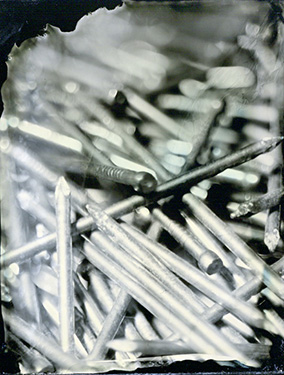


I've started sorting trays and piles of metal screws that have accumulated in our basement as we've worked on our old house for the last ten years. This doesn't sound very exciting, I know, but bear with me. The screws come from a hundred places—left over from dismantled furniture, lamps, electrical boxes, broken clocks, faucets, stoves, etc. Some screws are a century old or older. Some are new. It seems a waste of time to sort them by size or style into little jars. But I’m talking about pounds and pounds of screws—screws for metal, wood, plaster, masonry; screws thicker than your thumb; screws as small as a mouse's toe bone. You can't just toss all of that out.
Go to any “country” auction and you’ll find tables and tables of aged tools and machine parts and—what seems inexplicable to many—dusty jars and boxes of nuts, bolts, and screws. I seek these out and, when I find them, scoop my hands into their heaping rusty weight. My father hoarded screws the way he hoarded pennies and nickels in jars. When I think about it now, it makes sense: metal is money. His collection of screws and nuts and washers—contained in tidy rows of baby-food jars—was nothing short of fabulous, occupying two tiers of four-foot shelving over his basement work bench.
My father’s example taught me that a man’s collection of screws is a measure of his experience and resourcefulness, for every screw marks a certain passage through certain kinds of work—clock repair, car repair, small-appliance repair, small motor repair, furniture repair, house hardware repair, and so on. A young man might be forced to buy a few bags or boxes of screws from the hardware store but, in time, he’d have accumulated enough through his various repairs to be self-sufficient. It seemed to me that every man would aspire to that day when he could, with confidence, descend to his shop, sort through his jars of nuts, bolts, and screws and extract just what he needed. That’s when a man would feel the full promise of his masculinity.
My father was the quintessential do-it-yourselfer. He repaired everything in our house, including our radios and television sets. After I broke the plastic pedal to my toy drum set, I thought for sure he’d have to buy me a new, better pedal—made of metal. I was thoroughly dismayed when he presented me with the repaired pedal, sandwiched between thin, neatly jig-sawed plywood and secured with tiny brass screws. It was obvious that this pedal would never break again and, really, I should have shown more gratitude as he proudly handed it over to me. Eventually I took his lesson to heart as I started collecting screws in my twenties, when I started buying tools of my own. Last year I fixed my household toaster using two screws from my vast collection. This year I’ve been repairing antique lamps—and I always find what I need in my many jars. I love that this impresses my wife. In those moments, I occupy the proud place my father once occupied and his father before him, our collections of screws assuring our spouses that we can take care of the business that has fallen to us—holding things together. But, as my wife reminds me: “Nobody does this any more.”
She may be right. The small things that men once repaired in their shops are now too shoddy to repair. Either the fix won’t take or it’s cheaper to buy a new replacement. Still, women young and old continue to joke about husbands who aren’t handy. Says one of my acquaintance, “Yeah, he uses his hands . . . to open the Yellow Pages.” So, the stereotype holds that the ideal man is also a handy man even now when there seems so little to fix and so few inclined to fix anything. My brother-in-law is so averse to manual labor that he refuses even to paint a room. His wife does things like that. I guess men have other, more sophisticated concerns, like taking care of the children. This is not to say that the DIY spirit has disappeared—there seems plenty of that to go around as today’s DIYers focus on the big stuff—laying down a new roof, sheet-rocking a room, building a backyard deck. It’s the little stuff, like those jars of screws, that are gone or going and with them a certain way of seeing and dealing with things that break. I tell myself that I accept this passing and, from this acceptance, I take some small pleasure in knowing that when I’m gone, my jars of screws will find their way onto an auction or flea market table, where they may cause passers-by to pause and ponder, asking, What kind of world would compel a man to spend so much time saving something of so little consequence?

